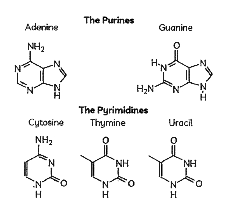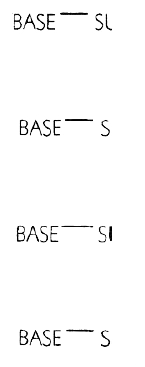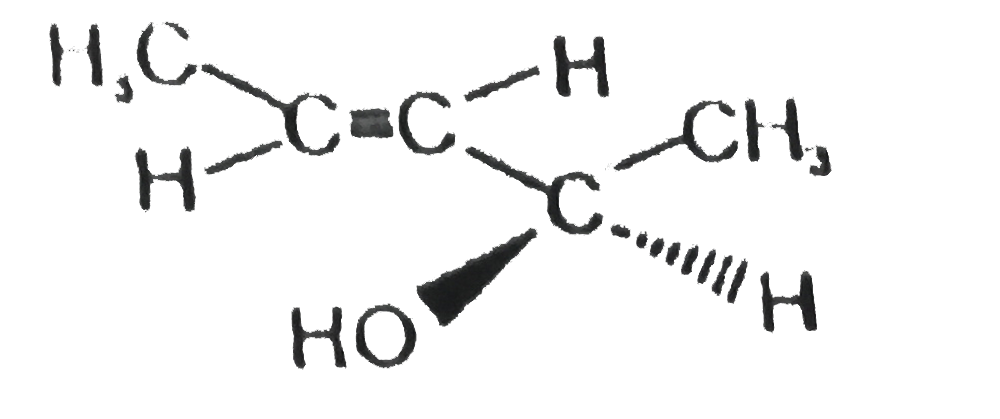A biologist studying the genetic code is interested to know the number of possible arrangements of 12 molecules in a chain. The chain contains 4 different molecules represented by the initials A(for a Adenine), C (for Cytosine), G (for Guanine) and T (for Thymine) and 3 molecules of each kind. How many different such arrangements are possible?
The number of different arrangements
=12!3!3!3!3!
=12×11×10×9×8×7×6×5×4×3!3×2×3×2×3×2×3!
=369600
Hence, the number of different possible arrangements are = 369600
Topper's Solved these Questions
Similar Questions
There are 3 white, 4 blue and 1 red flowers. All of them are taken out one by one and arranged in a row in the order. How many different arrangements are possible (flowers of same colurs are similar)?
View SolutionAssuming that each has icosahedral strcucture, determine how many isomers are possible for the B10C2H12 molecule ?
View Solution
Knowledge Check
- Question 1 - Select One
A schematic analysis of the reaction of the enantiomer with racemic mixture is shows below:
d+d and l−−→(d)−(d)The(+)-form ofA racemic mixture of+chiral moleculesother molecules with(d)−(l)50%(d)and50%(l)
The products (d-d) and (d-l) are clearly neither identical nor enantiomers (non-superimposable mirror images) as the diastereomers, stereoisomers that are not mirror images' . The formation of diasteromers allows the separation of enantiomers (called resolution) which is not easy as enantiomers have identical physical properties. One general with naturally occurring chiral molecule to form a pair of diastereomers. These can be separated easily as they have different physical properties. If the original chemical reaction can be reversed, the enantiomers can be isolated.
How many diastereomers are possible among all the possible stereoisomers of 2,3-dibromopentane ?A(a) 2B(b) 1C(c) 3D(d) 4 - Question 2 - Select One
Purines (Adenine and Guanine) and Pyrimidines (Cytosine and Thymine) are present in DNA in an equal ratio. Also, Purines and Pyrimidines are complementary in a polynucleotide chain. It means that the number of Adenine molecules should be equal to the number of Thymine molecules and the number of Gunanine molecules should be equal to the number of Cytosine molecules.

In a given strands of DNA, the base sequence is AGTCATGAT. What will be the basic sequence of its complementary strand.AAGTCATGCTBAGTCATGATCTCAGTACTADAGTGATGAT - Question 3 - Select One
A researcher studying organic compounds has found that five different molecules - T, W, X, Y and Z-form chains According to the following rules :
i) A chain consists of three or more molecules, though the molecules in the chain are not necessarily different.
ii) T is never found on either end of a chain.
iii) If W appears in a chain, it appears more than once.
iv) X is never found next to Y in a chain.
v) W is never found on the end of a chain unless Z is found somewhere in the chain.
vi) If Y appears in a chain, Z appears also.
Which of the following is a possible chain of molecules?AT X Y ZBY T X XCW Z T YDW W X Z
Read the passage given below and answer the question:
EVIDENCE FOR THE FIBROUS NATURE OF DNA
The basic chemical formula of DNA is now well established. As shown in Figure 1 it consists of a very long chain, the backbone of which is made up of alternate sugar and phosphate groups, joined together in regular 3' 5' phosphate di-ester linkages. To each sugar is attached a nitrogenous base, only four different kinds of which are commonly found in DNA. Two of these---adenine and guanine--- are purines, and the other two thymine and cytosine-are pyrimidines. A fifth base, 5-methyl cytosine, occurs in smaller amounts in certain organisms, and a sixth, 5-hydroxy-methyl-cytosine, is found instead of cytosine in the T even phages. It should be noted that the chain is unbranched, a consequence of the regular internucleotide linkage. On the other hand the sequence of the different nucleotides is, as far as can be ascertained, completely irregular. Thus, DNA has some features which are regular, and some which are irregular. A similar conception of the DNA molecule as a long thin fiber is obtained from physicochemical analysis involving sedimentation, diffusion, light scattering, and viscosity measurements. These techniques indicate that DNA is a very asymmetrical structure approximately 20 A wide and many thousands of angstroms long. Estimates of its molecular weight currently center between 5×106 and 107 (approximately 3×104 nucleotides). Surprisingly each of these measurements tend to suggest that the DNA is relatively rigid, a puzzling finding in view of the large number of single bonds (5 per nucleotide) in the phosphate-sugar back bone. Recently these indirect inferences have been confirmed by electron microscopy.

(source: Watson, J. D., & Crick, F.H. (1953, January). The structure of DNA. In Cold Spring Harbor symposia on quantitative biology (Vol. 18, pp. 123-131). Cold Spring Harbor Laboratory Press.)
DNA molecule has _______ internucleotide linkage and ______ sequence of the different nucleotidesView SolutionA researcher studying organic compounds has found that five different molecules - T, W, X, Y and Z-form chains According to the following rules :
i) A chain consists of three or more molecules, though the molecules in the chain are not necessarily different.
ii) T is never found on either end of a chain.
iii) If W appears in a chain, it appears more than once.
iv) X is never found next to Y in a chain.
v) W is never found on the end of a chain unless Z is found somewhere in the chain.
vi) If Y appears in a chain, Z appears also.
Which of the following is NOT a possible chain of molecules?View SolutionIf three gases X, Y and Z are arranged in increasing order of their relative molecular mass and the mass of each gas is 10 g at S.T.P state, which gas will contain the least number of molecules and which will contain the most?
View SolutionBroadly speaking there are four types of stereisomers namely conformational isomers geometrical isomers, enantiomers and diastereomers.Although conformational isomers , have same configuration geometrical isomers have different atoms attached to each of the doubly bonded carbon atom, and enantiomers are due to chirality in the molecule Enantiomers are also known as optical isomers and diastereomers are those stereoisomers which are not enantiomers.In simple compound, number of stereoisomers.In chiral molecule is given by the reaction 2n, where n is the number of dissimilar chiral carbon.
Observe the following structures and answer the questions given below :

How many stereoisomers are possible in pent-3-en-2-ol, CH3CH=CHCHOHCH3View SolutionEquals number of atoms are contained in one gram atomic weight of each element and the same number of molecules are found in one gram molecules weight of any compound . The terms gram atomic weight and gram molecular weight are used to refer to a fixed numer(Avogadro's number 6.022×1023) of particle. the term 'mole' stands for the amount of material which contains these number of particles. If 12 g C12 has equal number of atoms as Avogadro's number , what mass of .2He4 will contain same number of atoms?
View Solution

